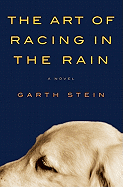
 I did not want to love this book. I put it down several times, once on a plane, halfway read, because I knew I was about to cry. I don't like being manipulated, perhaps because I'm a pushover. I also thought, the story is too melodramatic; how can one man have so much bad karma? And yet . . . I kept reading, I kept weeping (many thanks to the server at 35th St. Bistro for the extra napkins; I think I made a sale), and I was won over.
I did not want to love this book. I put it down several times, once on a plane, halfway read, because I knew I was about to cry. I don't like being manipulated, perhaps because I'm a pushover. I also thought, the story is too melodramatic; how can one man have so much bad karma? And yet . . . I kept reading, I kept weeping (many thanks to the server at 35th St. Bistro for the extra napkins; I think I made a sale), and I was won over.The narrator, Enzo, is a dog, a charmer, and erudite, too. He's learned about life from his owner, Denny, by watching and listening carefully (what else can he do?), and from TV. He and Denny especially like to watch racing tapes together, for Denny is a race car driver, when he can afford it, and Enzo is a racer at heart.
Racing, both in fact and metaphor, anchor the book. Racing in the rain requires a relaxed posture, a light foot on the pedals, a deft touch with the steering wheel, the ability to anticipate. When Enzo finally makes his peace with Eve, Denny's wife, he says: "She was my rain. She was my unpredictable element. She was my fear. But a racer should not be afraid of the rain; a racer should embrace the rain . . . By changing my mood, my energy, I allowed Eve to regard me differently. And while I cannot say that I am a master of my own destiny, I can say that I have experienced a glimpse of mastery."
Enzo has strong opinions about destiny, about people and about dogs, believing that man's closest relative is not the chimpanzee, but is, in fact, the dog. His logic: The so-called dew-claw is evidence of a pre-emergent thumb, and this is either snipped off or bred out of dogs in order to prevent them from becoming dexterous. And the clincher? Consider the werewolf:
The full moon rises. The fog clings to the lowest branches of the spruce trees. The man steps out of the darkest corner of the forest and finds himself transformed into . . .For all of Enzo's philosophizing, he is still a dog, and his doggishness frustrates him--gestures are all he has, and he wields them judiciously, barking at Denny when he starts to drink too much, chewing up court papers when Denny starts to capitulate to his in-laws' lawsuit and transforming a hot pepper into an act of richly deserved retribution. In a wild moment of grief, reverting to pure dog, he kills and eats a squirrel.
A monkey?
I think not.
At the end of the book, feeling both sorrow and joy, I turned back to something Enzo said about Denny, which also sums up this remarkable dog: "The true hero is flawed. The true test of a champion is not whether he can triumph, but whether he can overcome obstacles--preferably of his own making--in order to triumph. A hero without a flaw is of no interest to an audience or to the universe." Enzo, and Denny, are heroes truly worth our attention.--Marilyn Dahl

